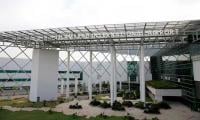Hong Kong: Macau ordered compulsory coronavirus testing for all residents on Wednesday after a family of four was found to be carrying the Delta variant, breaking the city’s record of over 16 months virus-free.
Over the next three days authorities plan to test all 680,000 residents at 41 testing centres, the government said. The testing is one of a host of new measures announced after the gambling hub recorded 491 days without a single local infection.
Authorities are investigating whether the daughter of the family contracted the virus on a flight from Zhuhai to Xi’an in mainland China in July, Macau’s leader Ho Iat-seng said on Wednesday.
The same flight carried two other infected people from Nanjing, the centre of a Delta-variant outbreak in China that has led to more than 300 new cases across 15 provinces and cities in two weeks.
Long queues formed on Wednesday morning outside testing centres and the city’s health app crashed, local media reported. Macau has adopted mainland China’s health app, which rates infection risk, tracks movement and generates test and vaccination records.
"I have to say sorry to all residents," Ho told reporters. Macau has kept infections low by closing itself off from the rest of the world for much of the pandemic and placing restrictions on arrivals from mainland China.
It has recorded only 60 cases and no deaths. But the zero-Covid strategy has come with deep economic costs for the only place in China where gambling is allowed.
Macau’s casinos account for about 80 percent of government revenue. The city ordered a shutdown of all casinos for two weeks when the virus was first detected last year, causing a loss of $937 million, according to an estimate by the University of Macau.
Revenues have climbed this year as some of the border restrictions with mainland China were relaxed but they remain well below pre-pandemic levels.
Meanwhile, China on Wednesday tightened overseas travel restrictions for its citizens as part of efforts to contain rising coronavirus cases, after reporting its highest number of infections in months. The movement of people is coming under more restriction inside China - with localised transport closures and stay-at-home orders in places in some cities - and beyond China’s borders.
China had previously boasted of its success in crushing Covid-19, with hard lockdowns in the early stages mixed with tight controls of its borders, but mass testing campaigns have uncovered Delta variant infections across the country.
The latest outbreak is threatening to undo the country’s economic rebound and return to normal life with nearly 500 domestic cases reported since mid-July. Local governments have tested entire cities and locked down millions, with the official figures on Wednesday revealing 71 new infections -- the most since January, but still a low caseload despite the outbreak spreading to dozens of cities.
The outbreak, which began when an infection among passengers on a flight from Moscow spread to airport cleaners in Nanjing, Jiangsu province, has exposed weaknesses in the country’s already strict border containment measures.
China’s immigration authority on Wednesday announced it would stop issuing ordinary passports and other documents needed for exiting the country in "non-essential and non-emergency" cases.
In a related development, Indonesia’s coronavirus death toll topped 100,000 on Wednesday as the country struggles to control the spread of the Delta variant. Southeast Asia’s biggest economy has now detected Delta in dozens of regions since it was first found in the archipelago in June.
Meantime, the European Commission announced on Wednesday it has signed a preliminary deal to buy up to 200 million doses of a promising Covid-19 vaccine from US pharmaceutical firm Novavax.
The advance purchase agreement was contingent on the Novavax vaccine being approved by the EU’s regulator, the European Medicines Agency, the commission said in a statement.
EU health commissioner Stella Kyriakides said: "Our new agreement with Novavax expands our vaccine portfolio to include one more protein-based vaccine, a platform showing promise in clinical trials."
If approved, the Novavax jab would slot in alongside the EU’s Covid-19 vaccines already in use: the one from BioNTech/Pfizer, which forms the backbone of its vaccination rollout; as well as those from AstraZeneca, Moderna and Johnson & Johnson.
This handout photo taken on December 14, 2024 and released by the South Korean Presidential Office shows then...
Students and supporters shout slogans during a 'March for Unity' organised by the Anti-Discrimination Student Movement...
Former US president-elect Donald Trump gestures during a gathering. — AFP/FileUS President-elect Donald Trump’s...
Migrants on flimsy boat in journey across the Channel . — AFP/FileLONDON: The number of irregular migrants...
This representational image shows smoke emanating from a cigarette. — Unsplash/FileMILAN, Italy: Smokers in Italy´s...
Fireworks on New Year's Eve near birds sitting on a tree. — X@howardignatius/FileBERLIN: Five people died across...







